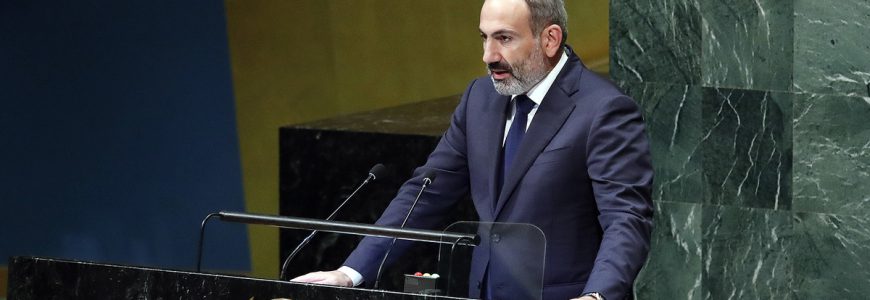YEREVAN, September 26. /ARKA/. Addressing the P the 73rd session of UN General Assembly in New York Armenian Prime Minister Nikol Pashinyan said the peaceful resolution of the Nagorno-Karabakh conflict continues to prevail on Armenia’s foreign policy agenda. In his words, the status and security of the Republic of Artsakh (Nagorno-Karabakh) is an absolute priority of the Republic of Armenia in the negotiation process.
He said any attempt to resolve the conflict through military means represents a direct threat to the regional security, democracy and human rights.
‘Armenia will continue its constructive engagement in the peaceful resolution of the conflict within the format of the OSCE Minsk Group Co-Chairs, which has the only internationally recognized mandate to deal with the conflict.
Azerbaijan should change its behavior of disrespect towards the negotiations and abandon the idea of any military solution and implement all the previous agreements. Furthermore, if Azerbaijan is truly committed to the peace process it should start talking to the main subject of this conflict – Nagorno-Karabakh.
Azerbaijan declares on every occasion that Karabakh should be a part of its territory. At the same time it announces that it will not negotiate with Nagorno Karabakh. The question is how Azerbaijan can make a claim over Nagorno-Karabakh without even speaking to Nagorno Karabakh? Is that possible? This is possible only if Azerbaijani government wants the territory and not the people.
Thus, it becomes obvious that the intention of Azerbaijani leadership is to cleanse Armenians from Karabakh, like they did in Nakhijevan. This entitles Nagorno-Karabakh to make the argument, that to be a part of Azerbaijan for Karabakh means to be totally exterminated. Hence Karabakh must not be a part of Azerbaijan, unless one wants to trigger a new genocide of Armenian people.
Summing up, let me reiterate: the conflict can and should be settled only through mutual compromises by all sides, in an atmosphere conducive to peace and not war.
Last but not least; let me also express my satisfaction to the Secretary General of the United Nations for his unwavering support to the efforts and approaches of the OSCE Minsk Group Co-Chairmanship.
The Nagorno-Karabakh conflict erupted into armed clashes after the collapse of the Soviet Union in the early 1990s as the predominantly Armenian-populated enclave of Azerbaijan sought to secede from Azerbaijan and declared its independence backed by a successful referendum.
On May 12, 1994, the Bishkek cease-fire agreement put an end to the military operations. A truce was brokered by Russia in 1994, although no permanent peace agreement has been signed.
Since then, Nagorno-Karabakh and several adjacent regions have been under the control of Armenian forces of Karabakh. Nagorno-Karabakh is the longest-running post-Soviet era conflict and has continued to simmer despite the relative peace of the past two decades, with snipers causing tens of deaths a year.
On April 2, 2016, Azerbaijan launched military assaults along the entire perimeter of its contact line with Nagorno-Karabakh. Four days later a cease-fire was reached.

